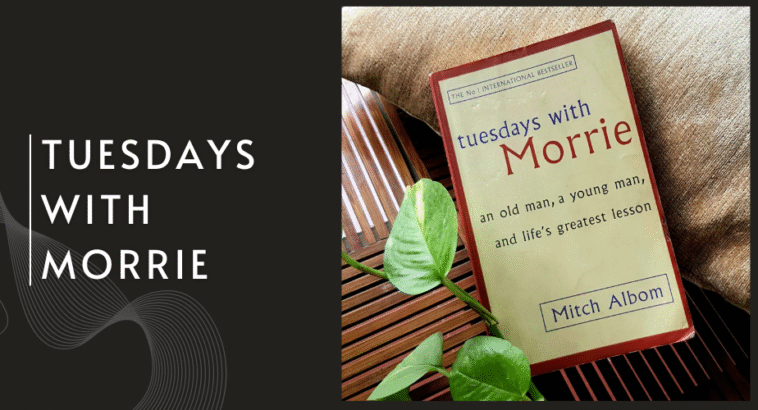The world changes rapidly, but certain truths about the human condition remain timeless. Tuesdays with Morrie, Mitch Albom’s beloved memoir, offers one of the most heartfelt explorations of those truths. First published in 1997, the book captures Albom’s weekly conversations with his former sociology professor, Morrie Schwartz, who was living with ALS (amyotrophic lateral sclerosis).
The memoir quickly transcended its personal narrative to become a philosophical guide on living with purpose, loving deeply, and embracing mortality without fear. Readers turn to Tuesdays with Morrie not for quick fixes but for enduring wisdom that applies to both everyday struggles and life’s biggest questions.
This article takes a deep philosophical look at the book, the Tuesdays with Morrie movie adaptation, and the universal lessons Morrie’s life leaves behind — lessons that can help us navigate our own search for meaning.
A Brief Overview of Tuesdays with Morrie
The story behind Mitch Albom’s visits
Mitch Albom reconnected with Morrie Schwartz after seeing him interviewed on television. What began as a chance reunion turned into a standing appointment every Tuesday, with Mitch traveling to Morrie’s home for conversations about life, death, love, work, family, and meaning.
Morrie, aware that his illness was terminal, used these meetings to impart wisdom not from academic theory but from lived experience — a philosophy shaped by empathy, kindness, and clarity about what truly matters.
Themes that shaped the memoir’s legacy
The memoir revolves around themes that speak to all generations: the inevitability of death, the primacy of love over material wealth, and the importance of community. These themes are explored through intimate storytelling rather than abstract philosophical treatises, making them deeply accessible.
The Philosophical Core of Morrie’s Teachings
Love as life’s central purpose
For Morrie, love wasn’t simply an emotion — it was the organizing principle of a meaningful life. He stressed that relationships, not possessions or achievements, are what endure.
Death as a teacher, not an enemy
Morrie reframed death not as a tragic end but as an opportunity to live more intentionally. Knowing life is finite encourages prioritizing what truly matters.
Community, compassion, and human connection
His advice consistently emphasized belonging to a larger community, caring for others, and allowing vulnerability to strengthen relationships.
Key Life Lessons from Tuesdays with Morrie
Detaching from materialism
Morrie challenged the cultural fixation on wealth and status, pointing out that these rarely lead to long-term happiness. Instead, he suggested investing in experiences and relationships.
Embracing emotional honesty
Rather than suppress emotions, Morrie encouraged feeling them fully and then detaching — a process that allows growth without being consumed by negativity.
Creating your own culture of meaning
Instead of blindly following societal norms, Morrie urged people to consciously define values and build a life around them.
Comparing the Book and the Tuesdays with Morrie Movie
Narrative differences and adaptations
The Tuesdays with Morrie movie, starring Jack Lemmon and Hank Azaria, condenses some conversations and dramatizes moments for cinematic impact. While the essence remains faithful, certain nuances from the book are lost in favor of pacing.
Emotional impact across mediums
The movie’s visual storytelling adds emotional immediacy — seeing Morrie’s physical decline can be more impactful than reading about it — but the book offers richer detail in philosophical discussions.
Philosophical Influences in Morrie’s Ideas
Existentialism and finding personal purpose
Like existentialist thinkers, Morrie believed meaning isn’t given; it’s created. His advice mirrors Jean-Paul Sartre’s assertion that we must define our own essence through action.
Stoicism’s echoes in accepting life’s impermanence
Morrie’s acceptance of his illness reflects a Stoic mindset: focus on what you can control, accept what you cannot, and maintain inner peace despite external hardship.
Applying Morrie’s Teachings in Modern Life
Practicing mindful presence
In an age of constant distraction, Morrie’s focus on presence is radical. Simple practices — like undistracted conversations — can deepen relationships.
Building meaningful relationships in a digital age
While technology connects us globally, it can also dilute intimacy. Morrie’s wisdom reminds us to prioritize depth over breadth in our social lives.
Critiques and Limitations of the Memoir
Idealism vs. practical reality
Some critics argue Morrie’s advice leans toward idealism, ignoring structural inequalities that limit personal choice. While the principles are universal, their application may be constrained by life circumstances.
The risk of oversimplifying deep truths
Condensing life’s complexities into short aphorisms risks losing nuance. The challenge is translating inspiration into sustainable action.
Why Tuesdays with Morrie Endures Across Generations
Its role in literature, education, and pop culture
The book is a staple in high school and college curricula, used to spark conversations about ethics, philosophy, and mortality.
Why young readers connect with it differently than older ones
Younger readers often see the book as aspirational, while older readers may find it reflective — a mirror for their own life experiences.
Conclusion: Reframing Life’s Priorities Through Morrie’s Lens
Tuesdays with Morrie isn’t just a memoir; it’s a philosophical dialogue about living with intention. Morrie Schwartz’s life reminds us that meaning comes from love, connection, and purpose — and that facing death with grace can be the most life-affirming act of all.
FAQs
1. What is the main message of Tuesdays with Morrie?
The main message is that love, relationships, and living authentically matter more than wealth or status.
2. Is Tuesdays with Morrie based on a true story?
Yes, it’s a memoir by Mitch Albom, based on his real-life visits with his former professor, Morrie Schwartz.
3. How is the Tuesdays with Morrie movie different from the book?
The movie condenses events, omits some conversations, and dramatizes scenes for visual impact, but the core message remains intact.
4. What philosophical ideas are in Tuesdays with Morrie?
It incorporates themes from existentialism, Stoicism, and humanism, focusing on self-defined meaning and acceptance of mortality.
5. Why is Tuesdays with Morrie still popular?
Its universal themes of love, purpose, and mortality resonate across generations, making it relevant decades after publication.
6. Can the lessons from Tuesdays with Morrie be applied in modern life?
Yes — practices like mindful presence, valuing relationships over possessions, and embracing emotional honesty are timeless.
7. Is Tuesdays with Morrie a good book for young readers?
Absolutely. It offers accessible wisdom that can guide decisions and priorities early in life.




